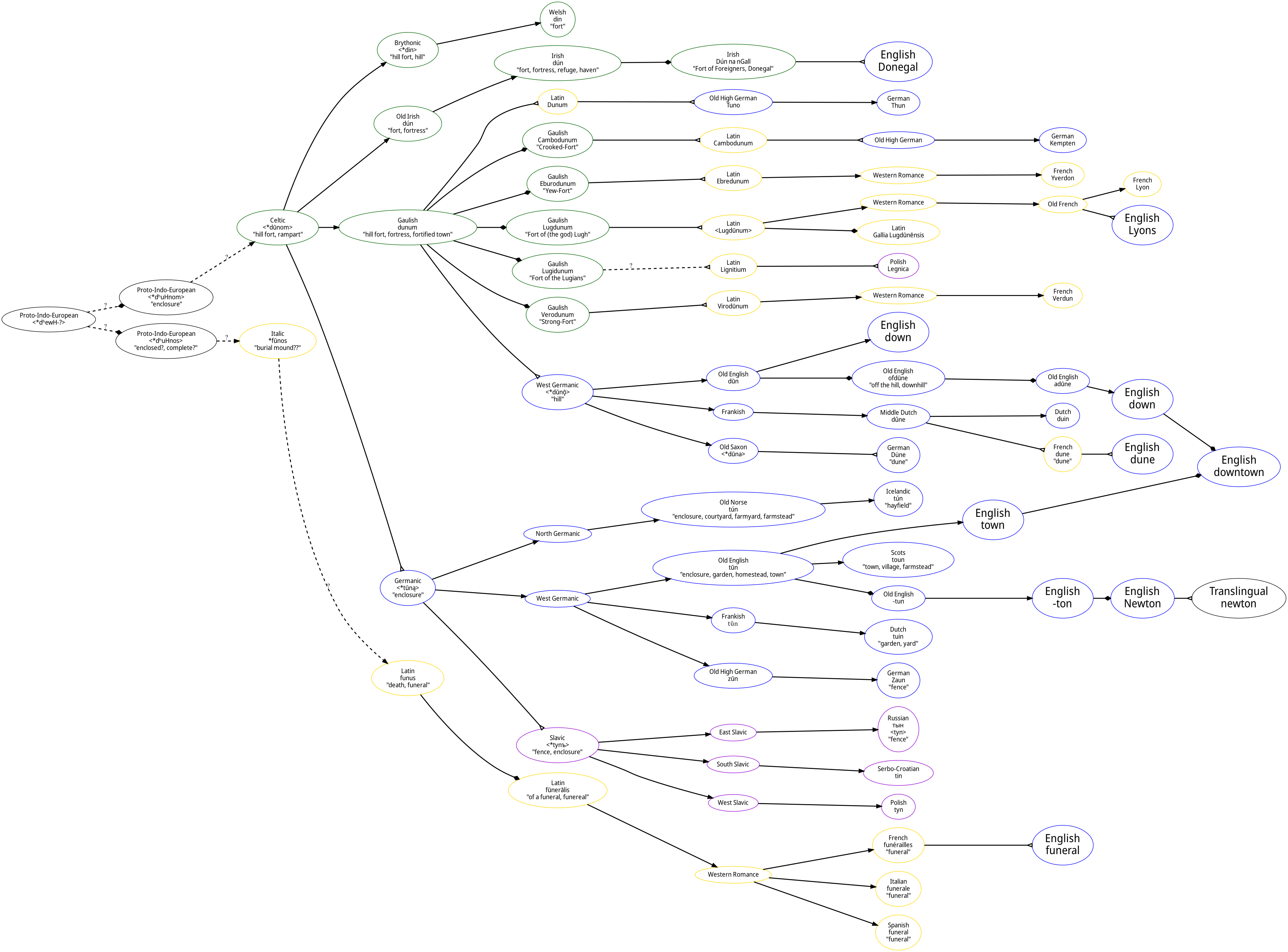September theme: Community 🏘️
Introduction
The Celtic word *dūnom: "hill fort" was borrowed into Germanic twice, once as "hill" and once as "fort".
The first time was borrowed before the completion of Grimm's Law, so Grimm's Law changed the *d to *t for Germanic *tūną: "enclosure", which eventually gave English "town".
The second time appears to have been a borrowing specifically from Gaulish into West Germanic, after each family had split into subfamilies and Grimm's law was no longer active, so we get West Germanic *dūnǭ: "hill". This gives English "down", meaning "a hill"; and eventually "down" the direction, which comes from the compound adūne/ofdūne meaning "off the hill, downhill".
While some sources list the PIE root *dʰewH- as an origin, I don't know of any good evidence for this as a root and not just a Proto-Celtic word *dūnom, except for a possible connection to Latin funus, which would still not be enough to push it all the way back to PIE.
Teaser
Full Text
-
Proto-Indo-European *dʰewH-?
-
Proto-Indo-European *dʰuHnom enclosure
-
Celtic *dūnom hill fort, rampart
-
Brythonic *din hill fort, hill
- Welsh din fort
-
Old Irish dún fort, fortress
-
Irish dún fort, fortress, refuge, haven
-
Irish Dún na nGall Fort of Foreigners, Donegal
- English Donegal
-
-
-
Gaulish dunum hill fort, fortress, fortified town
-
Latin Dunum
-
Old High German Tuno
- German Thun
-
-
Gaulish Cambodunum Crooked-Fort
-
Latin Cambodunum
-
Old High German
- German Kempten
-
-
-
Gaulish Eburodunum Yew-Fort
-
Latin Ebredunum
-
Western Romance
- French Yverdon
-
-
-
Gaulish Lugdunum Fort of (the god) Lugh [1]
-
Latin Lugdūnum
-
Western Romance
-
Old French
- French Lyon
- English Lyons
-
- Latin Gallia Lugdūnēnsis
-
-
-
Gaulish Lugidunum Fort of the Lugians
-
Latin Lignitium
- Polish Legnica
-
-
Gaulish Verodunum Strong-Fort
-
Latin Virodūnum
-
Western Romance
- French Verdun
-
-
-
West Germanic *dūnǭ hill
-
Old English dūn
- English down
-
Old English ofdūne off the hill, downhill
-
Old English adūne
-
English down
- English downtown
-
-
-
Frankish
-
Middle Dutch dûne
- Dutch duin
-
French dune dune
- English dune
-
-
Old Saxon *dūna
- German Düne dune
-
-
-
Germanic *tūną enclosure
-
North Germanic
-
Old Norse tún enclosure, courtyard, farmyard, farmstead
- Icelandic tún hayfield
-
-
West Germanic
-
Old English tūn enclosure, garden, homestead, town
-
English town
- English downtown
- Scots toun town, village, farmstead
-
Old English -tun
-
English -ton
-
English Newton
- Translingual newton
-
-
-
-
Frankish tūn
- Dutch tuin garden, yard
-
Old High German zūn
- German Zaun fence
-
-
Slavic *tynъ fence, enclosure
-
East Slavic
- Russian тын tyn fence
-
South Slavic
- Serbo-Croatian tin
-
West Slavic
- Polish tyn
-
-
-
-
-
Proto-Indo-European *dʰuHnos enclosed?, complete?
-
Italic *fūnos burial mound??
-
Latin funus death, funeral
-
Latin fūnerālis of a funeral, funereal
-
Western Romance
-
French funérailles funeral
- English funeral
- Italian funerale funeral
- Spanish funeral funeral
-
-
-
-
-
-
Visual
Collected English words
Donegal, Lyons, down, downtown, dune, town, -ton, Newton, newton, funeral
Footnotes
-
^
Lugdunum is sometimes also given as origin of London, but that doesn't stand up to reconstruction. Comparison of the Latin, Old English, and Welsh names of London point towards a Celtic reconstruction looking more like *Londonjon, possibly meaning "sunken (or flooded) place".
